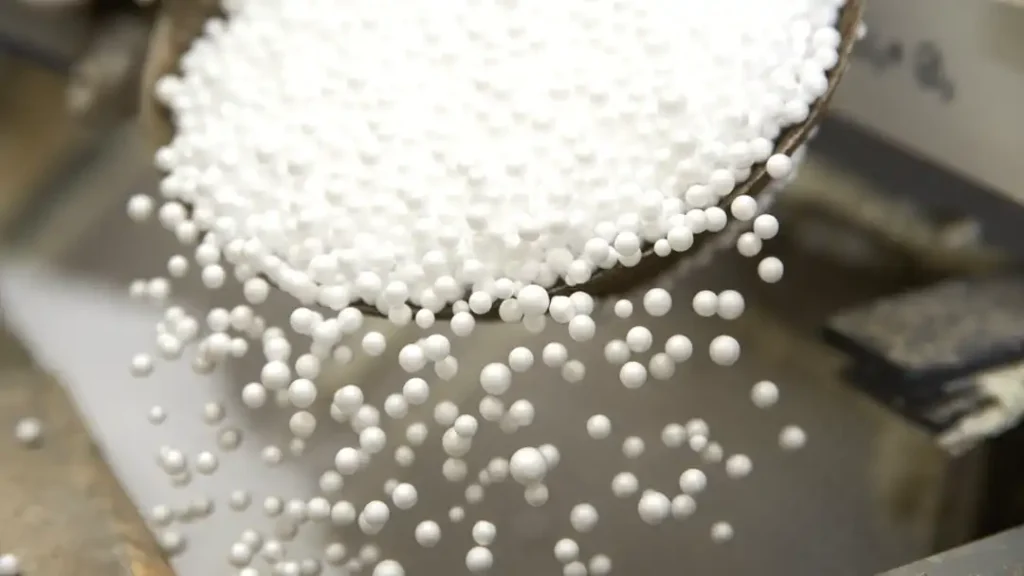Supplier of Expanded Polystyrene (EPS) From Turkey and Dubai UAE

Descriptions of Expanded Polystyrene (EPS)
Expanded Polystyrene (EPS) is a lightweight, rigid plastic foam material made from polystyrene, a polymer produced from styrene monomer. It is expanded using a blowing agent such as pentane, resulting in a foam structure containing approximately 98% air and 2% solid polystyrene.
This unique composition makes EPS extremely lightweight yet strong, giving it exceptional thermal insulation, moisture resistance, and shock-absorbing properties. It is widely molded into blocks, sheets, and custom forms to meet industrial requirements in construction, packaging, automotive, and insulation applications.
Key Properties of Expanded Polystyrene (EPS)
-
Lightweight: EPS is easy to handle and transport, significantly reducing logistics and installation costs.
-
Thermal Insulation: Its closed-cell structure minimizes heat transfer, ideal for building insulation and cold storage systems.
-
Shock Absorption: EPS provides superior protection for fragile products during shipping and handling.
-
Moisture Resistance: It resists water absorption, ensuring consistent performance in humid environments.
-
Durability: Resistant to mold, rot, and decay, EPS offers a long service life in demanding environments.
-
Recyclability: Fully recyclable into new polystyrene products, supporting sustainable material use.
Applications and Uses of Expanded Polystyrene (EPS)
1. Construction and Building Insulation
EPS is extensively used in wall insulation panels, roofing, and underfloor systems due to its energy efficiency and long-term durability. It reduces energy consumption and enhances comfort in both residential and commercial buildings.
2. Packaging Industry
EPS is one of the most popular packaging materials for electronics, appliances, and fragile goods. Its cushioning ability protects products during transportation. In the food sector, EPS trays, boxes, and containers preserve freshness and temperature consistency.
3. Automotive Industry
In automotive manufacturing, EPS is used in impact-absorbing components, headrests, and seat cushions. Its lightweight structure contributes to fuel efficiency and passenger safety.
4. Cold Storage and Refrigeration
EPS plays a key role in maintaining temperature stability in cold storage, refrigerated trucks, and food supply chains. Its insulation capacity ensures energy efficiency and product protection.
5. Civil and Geoengineering
EPS geofoam is used as a lightweight fill material in road embankments, bridge abutments, and retaining walls. It minimizes settlement and distributes loads evenly across large infrastructure projects.
6. Arts, Design, and Model Making
Due to its easy cutting and shaping properties, EPS is widely used in theater design, architectural modeling, and art installations.
7. Industrial Applications
EPS is also employed in manufacturing panels, decorative moldings, and structural cores for composite materials.
Handling, Storage, and Safety Guidelines
While EPS is a stable and non-toxic material, the following precautions are recommended:
-
Keep EPS away from open flames and high temperatures, as it is flammable.
-
Provide proper ventilation when cutting or sanding to prevent inhalation of fine dust.
-
Store in cool, dry, and shaded conditions to maintain integrity.
-
Recycle used EPS responsibly to reduce environmental impact.
Packing and Container Loading Details
EPS Packaging Options
EPS granules and molded products are packaged to ensure safe transport and storage:
-
25 kg Bags: Suitable for small-scale manufacturing or laboratory use.
-
500–1,000 kg Jumbo Bags (FIBCs): Ideal for industrial and export-scale supply, ensuring moisture protection and easy handling.
Container Loading Information
For export shipments:
-
20-ft Container: Typically holds 8–10 metric tons of EPS, depending on packaging type.
-
40-ft Container: Can accommodate up to 18–20 metric tons for bulk exports.
Technical Data Sheet of Expanded Polystyrene (EPS)
| Properties | |
|---|---|
| Bead Size – Diameter | 0.9 – 1.3 mm |
| Blowing Agent – Pentane | 5.6 – 7 % |
| Residual Styrene Monomer | Less than 1000ppm |
| Moisture Content | Less than 1% |
| CFC Content | Nil |
| Flammability | DIN4102 B1, EN ISO 11925-2/ EN 13 501 E |
| Density | 13 – 20 kg/m3 |


